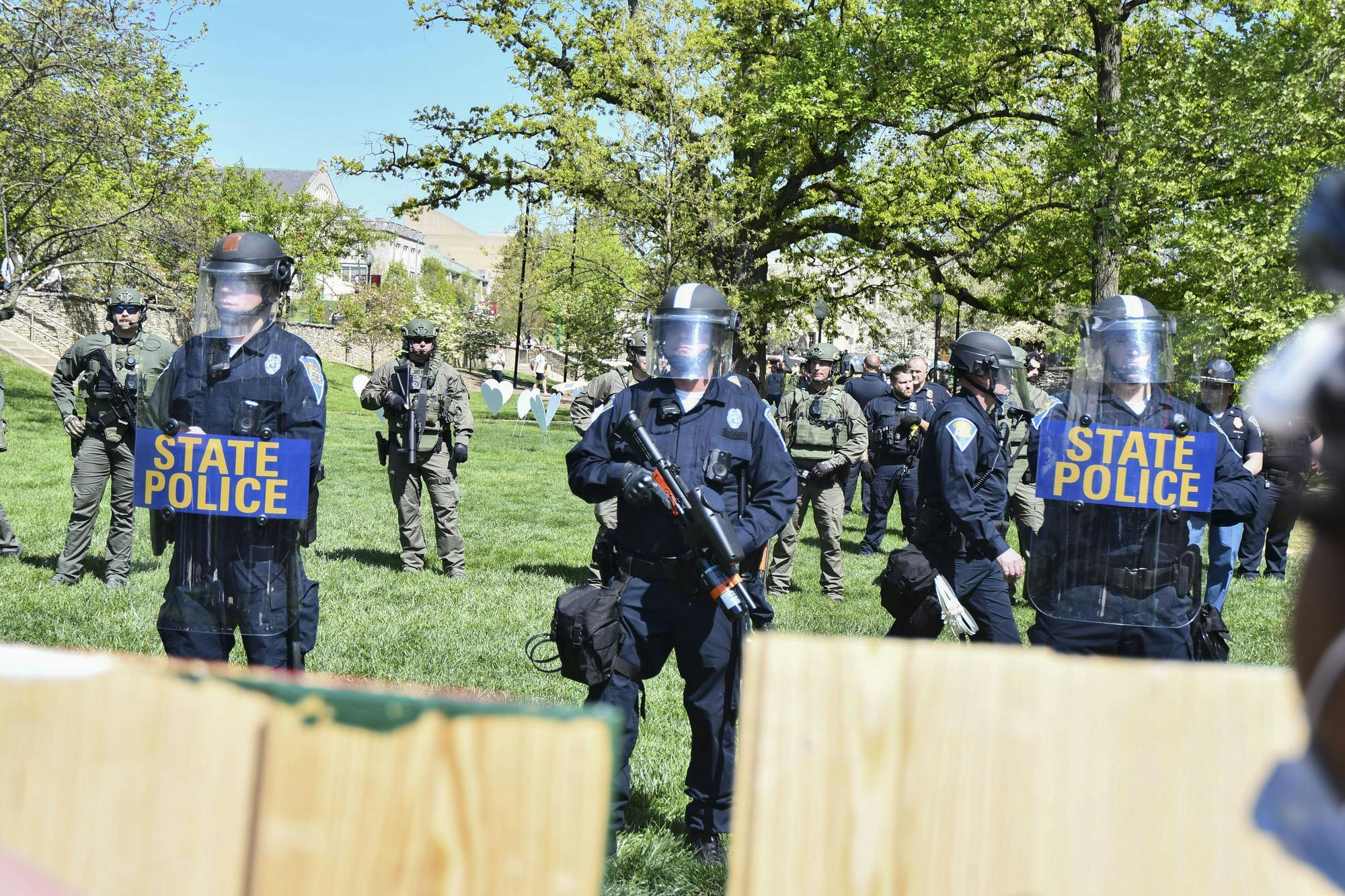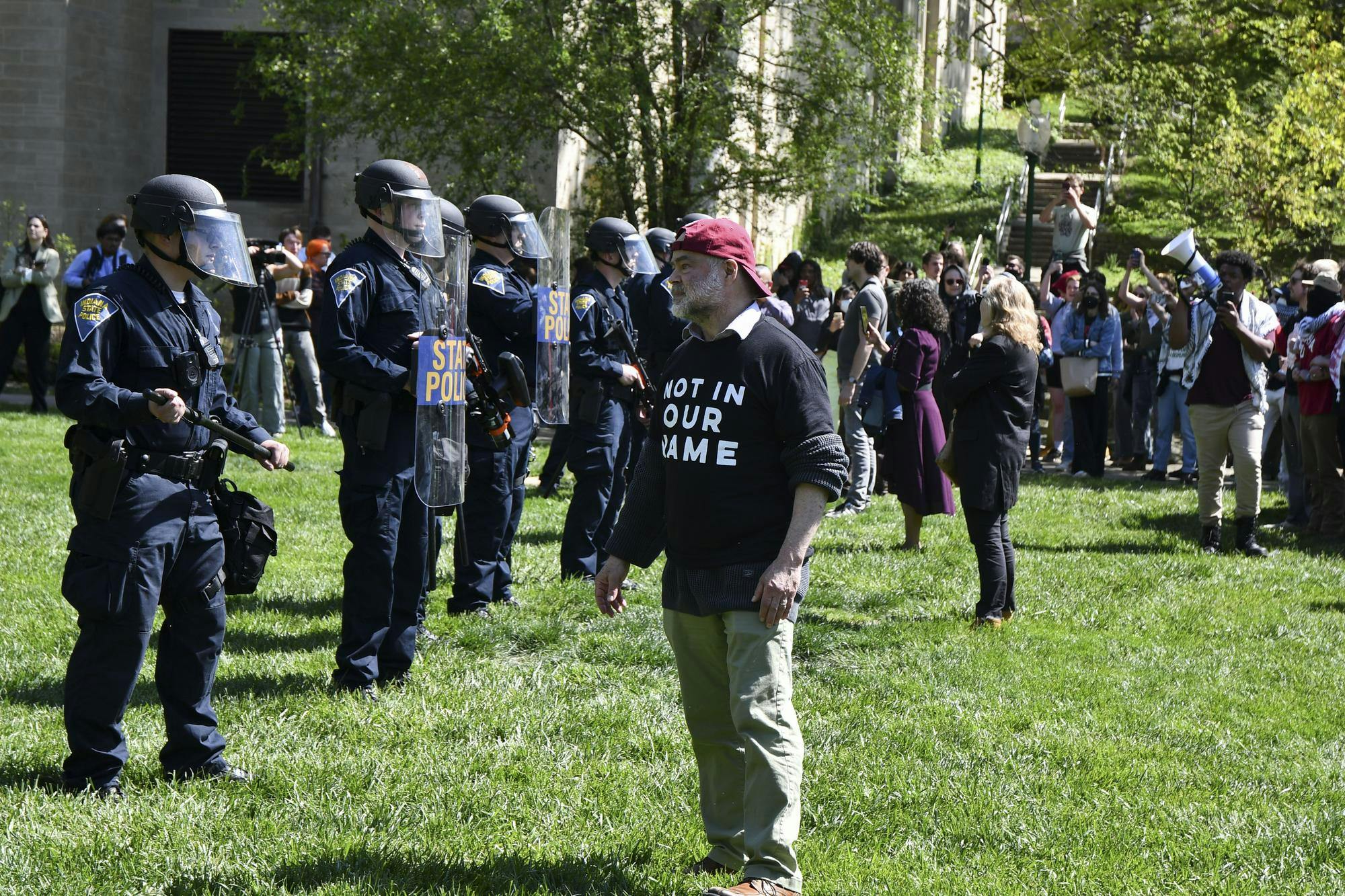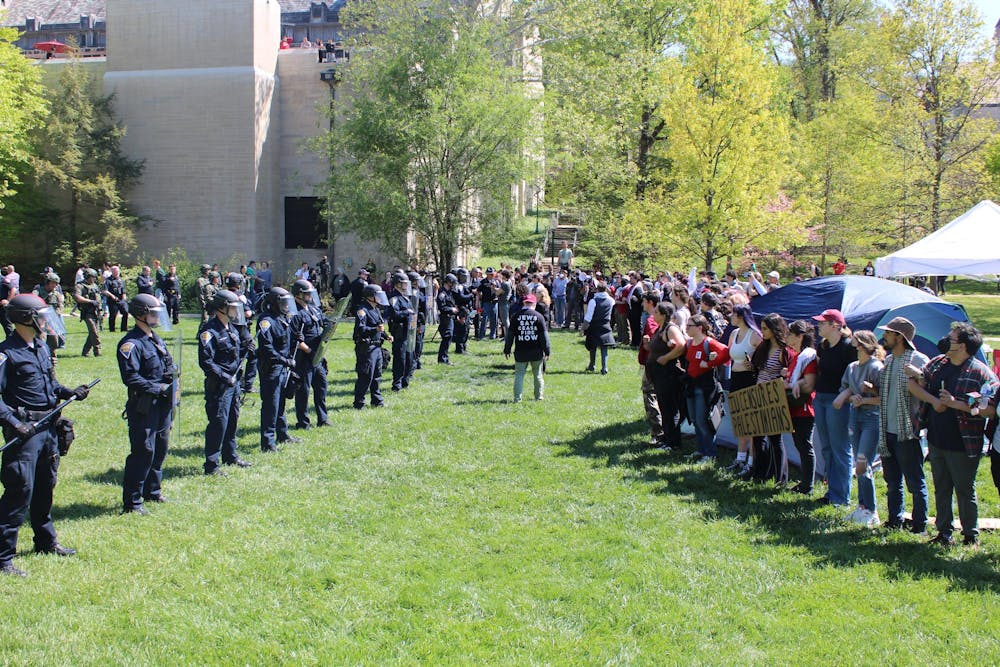Indiana State Police and the Indiana University Police Department arrested 33 pro-Palestinian protesters in Dunn Meadow on Thursday during an hours-long protest and encampment. The protest was organized by the IU Divestment Coalition, a newly created organization calling for IU to divest from Israel, among other demands.
The protesters set up encampments in Dunn Meadow around 11 a.m., and by 4 p.m., IUPD and ISP descended on the scene, meeting the peaceful protest with physical force.
Before the physical confrontation, IUPD and ISP announced several warnings to protesters that arrests would follow if they did not immediately take down their tents. Around 1:25 p.m., an ISP trooper announced to the crowd that Indiana Gov. Eric Holcomb was aware of the situation. In response to threats of arrest, some protesters took several tents down and consolidated the encampment, guarding it through a chain of arm-linked protesters who encircled the area.
Arrests began right before 4 p.m., and at least 20 protesters were detained within 10 minutes. IUPD and ISP forcefully removed several protesters from tents, dragged them across the field and detained them using zip ties. ISP pushed repeatedly into the crowd, pulling people back and clashing with protesters.
ISP officers — some in riot gear and others in green uniforms — were armed with assault weapons, guns with less-than-lethal rounds, shields and pepper spray.
After clearing the encampment area, ISP and unidentified people in orange and yellow T-shirts tore down the remaining tents as police established a perimeter around the remaining protesters.
Police put the detained protesters on board an IU bus traveling to Harry Gladstein Fieldhouse, where they were then processed and later taken to Monroe County Jail. As the bus drove away from Dunn Meadow, arrested protesters could be heard chanting pro-Palestinian slogans.

An encounter between police and protesters is pictured April 25, 2024, at Dunn Meadow in Bloomington. 33 people were arrested on Thursday.
What happened to protesters who were arrested?
Officers told IDS reporters that those arrested would be charged with criminal trespassing, while others would be charged with battery and resisting law enforcement. The IDS confirmed that several of those arrested for trespassing are now forbidden from entering IU’s campus for a year.
Mark Bode, executive director of media relations at IU, sent a statement to the IDS in response to an inquiry about arrested students and faculty who were temporarily banned from campus.
“We encourage affected faculty and students to engage in the appeals process by contacting IUPD,” the statement read. “Trespass ban notices will be suspended during the appeals process in nearly all cases. This will allow these students and faculty to complete the semester.”
Beginning at 6:08 p.m., the arrested protesters were booked into the Monroe County Jail in two busloads. The first busload was let off one-by-one, their hands still zip-tied behind them. They were photographed with a paper stating their names in front of them and then led into the jail.
They could be seen sitting on the ground until the jail door closed. Officers did not respond to immediate questions, referring IDS reporters to jail public information officers.

A protestor stands in front of an IU bus on East Seventh Street on April 25, 2024, in Bloomington. Those arrested during the protest were shuttled away using IU buses.
The second bus arrived almost an hour later. Some protesters were photographed in front of the bus, but a majority were led straight into the jail. Police had to remove protesters’ masks so they could be photographed.
Friends and family members of the protesters came to the jail, waiting for them to be released. Bloomington resident Cicada Dennis’s wife, Barbara, was one of the people arrested during the protest.
"She's pretty angry about the way that the police have handled the situation,” Dennis said. “The fact that they were arresting people for basically exercising their First Amendment rights to free speech. And also the way that the police like pushed her, because she was just standing, and they were pushing her and pushing her.”
What were the goals of the protest?
In the IU Divestment Coalition’s Instagram post announcing a rally at Dunn Meadow, the organization listed four demands.
The first is the resignation of IU President Pamela Whitten, Provost Rahul Shrivastav and Vice Provost for Faculty and Academic Affairs Carrie Docherty. IU Bloomington faculty overwhelmingly passed votes of no confidence in Whitten, Shrivastav and Docherty on April 16.
The Instagram post references IU administration’s decision to suspend professor Abdulkader Sinno for allegedly misrepresenting an event organized by the Palestine Solidarity Committee in November 2023. It also references IU’s cancellation of Palestinian abstract painter Samia Halaby’s art exhibit after three years of planning, which occurred in the same week as Sinno’s suspension.
The second demand is for the university to end collaboration with Naval Surface Warfare Center, Crane Division — a U.S. naval installation southwest of Bloomington.

Indiana State Troopers form a line opposite of protestors in Dunn Meadow on April 25, 2024, in Bloomington. The State Police was brought in to clear the encampment on Thursday.
IU announced a $111 million investment including partnership with Crane in October 2023. As part of the commitment, IU is investing $23.5 million to hire 25 faculty members in microelectronics, focusing on faculty with U.S. Department of Defense experience.
It is unknown whether Crane is directly involved in the Israel-Hamas war. As of 2021, Crane is part of a research and development agreement with the Israeli defense company Smart Shooter — which focuses on increasing the accuracy of defenses against small, unmanned aircraft. Crane did not respond to a request for comment by the time of publication.
The third demand is for IU to adhere to the Boycott, Divestment and Sanctions movement — meaning the university would wholly financially divest from Israel.
Indiana passed an anti-BDS law in January 2016. The bill created a blacklist of non-profit and commercial organizations boycotting Israel, which would use state-managed funds, to divest from BDS-adhering organizations.
The fourth demand is for IU to open Muslim and Middle Eastern cultural centers. In January, Provost Shrivastav said that IU has been working on a Muslim cultural center for more than a year, though no specific details were announced.
Chabad counter-protest
A group outside Chabad at IU — a Jewish student organization — continually played music during the protest. They were told at least once by IUPD to shut the music off, moments before the police advanced on the encampment. Occasionally, protesters from the encampment and Chabad stood off across Seventh Street. Although shouting and making offensive gestures at each other, they never physically interacted.
Throughout the day, counterprotesters gathered with Israeli flags in front of the Chabad house, playing several songs on repeat, including Lee Greenwood’s “God Bless the USA” and Black Eyed Peas’ “Where is the Love?”
A counterprotester from Israel told the IDS that “Jews do not feel safe on campus.”

Students hold up a Israeli flag during a protest supporting Palestine on April 25, 2024, in Dunn Meadow in Bloomington. On the sidewalk, people chanted and yelled at protesters and police.
A report from the Anti-Defamation League released Jan. 10 documented a rise in antisemitism across the country in the months following the Oct. 7 attack, with 361% more antisemitic incidents occurring than in the same timeframe between 2022-23.
Islamophobia has also risen in the wake of the war. Between Oct. 7 and Nov. 4, the Council on American-Islamic Relations received 1,238 reports of bias and requests for help. In 2022, the average 29-day period saw only around 400 complaints.
The report includes incidents of “antisemitic rhetoric, expressions of support for terrorism against the state of Israel and/or anti-Zionism.”
The music continued through the night, including during a Seder held by the Dunn Meadow protesters. Seder is a traditional Jewish dinner, usually held once or twice during the holiday Passover.
Hudson Cain, an IU student involved with Chabad, said the music was an act of counterprotest. He said playing music from Israeli artists was a way of recognizing Jewish students’ existence.
Day-old IU policy changes lead to arrests
Since 1969, IU Bloomington policy has allowed the use of temporary structures in Dunn Meadow without prior approval, requiring approval only from 11 p.m. to 6 a.m. IU changed the policy to ban the use of structures without prior approval April 24 — a day before the IU Divestment Coalition set up encampments in Dunn Meadow.
The new policy, which can be viewed under the “Outdoor Spaces” dropdown menu on the Office of Student Life website, prohibits using permanent or temporary structures without approval by the Office of the Vice Provost for Student Life and University Events.
The new policy claimed the change was approved by “the Ad Hoc Committee,” but the IDS spoke with several faculty members who were unaware of such a committee.

A protestor is led to the buses after being arrested in Dunn Meadow during a protest supporting Palestine on April 25, 2024, in Bloomington. People who were arrested were shuttled to the Monroe County Jail.
In an email sent to faculty from Whitten on Thursday obtained by the IDS, Whitten acknowledged that the policy was changed yesterday in direct response to protesters planning to occupy Dunn Meadow.
“As we watched similar events unfold on numerous campuses around the country and prepared for today’s rally, we thoughtfully considered the best course of action for IU with the safety of our community being foundational to our decision,” Whitten said in the email. “We know that not all will agree with the course of action, but this was made through careful deliberation. Our university must create space for meaningful dialogue, while ensuring that our campus is safe and welcoming to all, and that peaceful protest, as many experienced today, symbolizes our steadfastness to the free expression of ideas.
IU executive director of media relations Mark Bode did not respond to a question regarding the “Ad Hoc Committee” members.
Pro-Palestinian protests seen across college campuses
The encampment Thursday featured numerous chants, including “free, free Palestine,” “from the river to the sea, Palestine will be free,” “intifada, intifada” and many times, “shame” against police and counter protesters.
“Intifada” in Arabic translates to “shaking off” or “civil uprising” and can also refer to a series of armed uprisings in Gaza and the West Bank against Israeli occupation.
On Oct. 7, 2023, a Hamas-led attack killed about 1,200 people in Israel and they abducted more than 250 hostages. In response, the Israeli government has killed more than 34,000 Palestinians, two-thirds of which are women and children. This has ignited pro-Palestinian protests worldwide.
However, the encampment Thursday comes after an intensifying wave of protests around U.S. college campuses starting at Columbia University last week. The protests spread across the country after protestors at Columbia refused to halt their protests after New York police made more than 100 arrests April 18.
Pro-Palestinian protests have also stayed consistent in the past months at IU. They began Oct. 9, 2023, as pro-Israel and pro-Palestinian protesters clashed at Sample Gates.

Aidan Khamis shouts in the megaphone during a protest April 25, 2024, in Dunn Meadow in Bloomington. Protestors shouted a variety of pro-Palestinian chants and slogans during the protest on Thursday.
More recently, pro-Palestinian protesters have shadowed student tours throughout campus, followed by the Indiana University Police Department throughout. At an April 8 protest, IUPD temporarily detained three protestors and arrested one for disorderly conduct.
At the men’s Little 500 race Saturday, several protesters chanted and marched outside the track. As they left in two cars, IUPD pulled them over asking for identification, later releasing them.
Protesters also set up encampments at Purdue University on Thursday, interrupting a speaker series with U.S. Senator Todd Young. Although Purdue campus policy does not allow overnight camping in public spaces, law enforcement had not removed any protesters as of Thursday evening.

IU Professor Benjamin Robinson talks to Indiana State Troopers on April 25, 2024, in Dunn Meadow in Bloomington. Robinson was arrested later during the protest.
Major protests have broken out at UCLA, the University of Southern California, George Washington University, Harvard University, New York University, Emory University, Yale University, Michigan State University and the University of Connecticut.
This story was updated to include a statement from Mark Bode in response to an inquiry about arrested students and faculty who were temporarily banned from campus.




